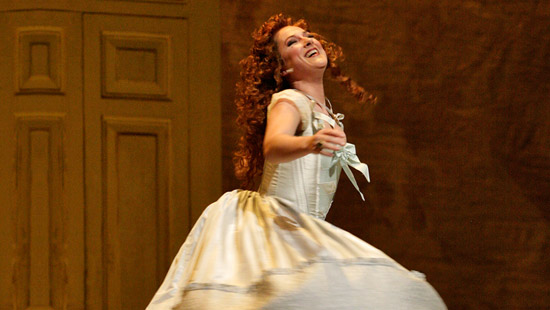Il Barbiere di Siviglia
Il Barbiere di Siviglia
February 8, 2012
Metropolitan Opera
It's a common consensus among opera lovers that if Wagner, Verdi and Puccini isn't what it used to be, we live in a golden age for Rossini. His rarer operas are being revived, there's a new breed of "Rossini tenors" that can handle his often fiendishly difficult music without cuts and transpositions, and in the old chestnuts like Barber of Seville, corrupt performance practices like huge cuts, line swapping, transpositions, and insertions of different arias into the Lesson Scene have mostly been abolished. This is all very good.
The heart of Il Barbiere of Siviglia, however, lies in the patter arias, duets and ensembles. Besides the three famous "patter" arias ("Largo al factotum," "La calunnia," and "A un dottor"), nearly every ensemble also develops into a "patter," with singers required to master this rapid-fire sing speech that often sounds like gibberish, but underscores the opera's theme of mistaken identities and pretentious, insincere personalities who are "blah blah blah"-ing at each other. The closest equivalent to "patter" would be the overlapping dialogue of the 1930's screwball comedies. Tonight's performance of Barber at the Met made me think that for all the great improvements in Rossini performance practice, the art of the patter has been lost.
To get an idea of what the patter songs can sound like, it's helpful to listen to old recordings. There, you can hear that when done well, the rapid-fire words roll off the tongues of the singer in this natural, sing-songy cadence that really resembles human speech when taken at a very fast rate. It's not about accuracy at all -- to the contrary, many of the old recordings sound almost semi-improvised on the spot. But listen to them, and you just hear a natural charm and joy to the way they patter that's infectious.
Here are a few examples.
The first is Mattia Battistini's "Largo al factotum," recorded in 1903. Notice how much he's rushing to fit the recording on one side of the '78, but how natural all of it sounds, although there are times when he seems to be improvising on the spot.
The second example is Ezio Pinza's "La calunnia." Again, notice both the liberties he takes with the music and the sing-songy cadence that Pinza maintains throughout the aria, that just lends an extra sparkle to the performance.
In tonight's performance, only the aging bass Ferruccio Furlanetto had any idea of how to: 1. project the patter portions of the music, so that they didn't just sound garbled and inaudible; and 2. make it all sound natural and funny. His Don Basilio was a highlight of the evening -- an old master still owning the stage and his voice still impressively majestic. John del Carlo (Bartolo) has a big, booming bass and was broadly comic as Rosina's lecherous guardian, but "A un dottor" become inaudible and weak during the patter portions. Rodion Pogossov (Figaro) -- same thing. Suave, debonair Figaro who has a pleasant lyric baritone, but completely missed the art of the patter.
I found youtube performances of John Del Carlo performing "A un dottor" and you can hear how much his voice drops out during the patter portions, as well as the way he fails to inflect the words with much personality:
Compare this to Renato Capecchi, who doesn't have a conventionally beautiful voice, but infuses the patter with tons of personality and charm, really sing-speech with more of an emphasis on the singing part:
The performance as a whole was fun, as was the Bartlett Sher production, although I thought some of the stage business relied too much on slapstick. Still, it's a production that doesn't really differ from any other Barbiere -- it's traditional, aesthetically pleasing, a good introduction to the opera. I can't believe this is the first time I'm seeing it live, and the first time I've seen Barber live since 2004. Colin Lee, the evening's Count Almaviva, is a singer I've never heard before. "Ecco, ridente" sounded rough vocally but once Lee warmed up he had a pleasing, if somewhat slender and generic-sounding lyric tenor voice. Unfortunately, the rapid-fire passagework was marred by distracting aspirates and snatches of breath, and noticeable physical discomfort. I know that most Almavivas nowadays sing "Cessa di piu resistere" but Lee seemed so out of gas that I thought the bad old days when this aria was cut might have been a good idea in this instance. Dramatically, he was rather reserved, without much of the requisite dash and charm.
Here is Damrau's "Una voce poco fa":
The chemistry between the characters in this ensemble opera was inconsistent. Damrau and Pogossov generated more sparks than Damrau and Lee, but I thought the best chemistry of the evening belonged to the Bartolo (Del Carlo) and Basilio (Furlanetto). Two old farts who take pleasure in each other's company.
Maurizio Benini conducted Rossini's sparking, ageless score with an appropriate bubbliness. Where was he when Marco Armiliato was ruining Anna Bolena with his xanax-like conducting?
The house was almost half-empty.
The house was almost half-empty.


Funny but I was there also, in the orchestra, and the orchestra was pretty full. Certainly not 1/2 empty as you state. And I had looked at orchestra tickets on sale earlier in the day and there were only a handful. So be careful about your pronouncements please.
ReplyDeleteWell I was in the dress circle and it was more than half empty.
ReplyDeletePoisonIvy did you end up seeing the Gotterdammerung with Dalayman and Gould?
ReplyDeleteYou had mentioned you were planning on going but I never saw a review...
No I never went ... I got bitten by a spider and my hand was swelling and rashing, so I exchanged my ticket.
ReplyDeleteouch hope you're better... which date are you now going on?
ReplyDeleteI exchanged it for the Barbiere actually.
ReplyDelete